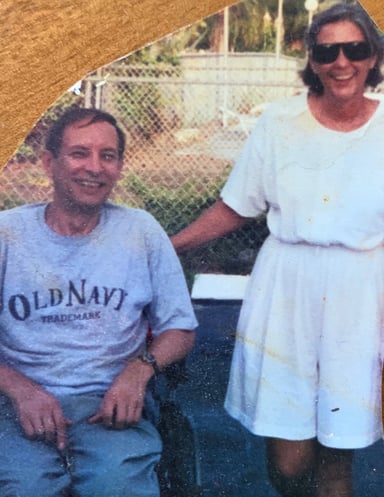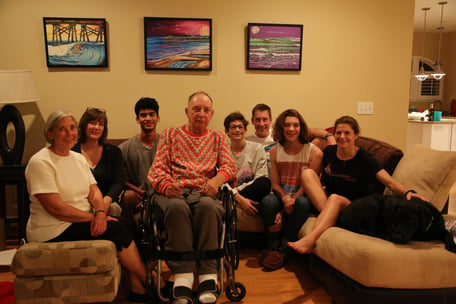A caregivers odyssey | Janice Lamotte Lavallee - Blog - Reeve Foundation
What happened to me did not happen in a vacuum; it began on a beautiful fall day, decades ago when my husband became disabled, and my life became an odyssey I never anticipated, nor something I was prepared for. Like many people today, my husband and I do not live near our friends and family, thus, his daily caregiving became my responsibility.
A doctor once told me that, as a caretaker, I needed to make time for myself. He emphasized that caretakers were susceptible to a myriad of illnesses, sometimes worse than the person they are caring for. I saw this happen to friends and never thought I was racing down the very same road as those individuals who I had counseled to take better care of themselves. Eventually, however, the years of caregiving did take their toll on me. I am now recuperating from two major surgeries within five months, and it will be many months before my body is fully recovered. So, I have had ample time to reflect.
As our population ages the functions of caregivers, particularly caregivers of family members, will become more problematic. Typically, the needs of the person receiving care overshadow the needs of the person providing care. Until recently, this subject was rarely voiced: “just a not-so-secret” family secret. As long as there is one individual in the home shouldering caregiving responsibilities, life continues routinely for everyone else.
 Each situation is different, but the facts regarding caregivers are clear. For example, Stanford University performed a study of caregivers of Alzheimer’s patients who may need to care for family members for 10 to 15 years, or even longer. The results of the study are stark: caregivers often die from stress-related disorders before the person they care for. And bear in mind that this study only covered Alzheimer’s patients. The long-term statistics for people such as myself who are caregivers for family members who are disabled or have some other form of incapacity; are grim.
Each situation is different, but the facts regarding caregivers are clear. For example, Stanford University performed a study of caregivers of Alzheimer’s patients who may need to care for family members for 10 to 15 years, or even longer. The results of the study are stark: caregivers often die from stress-related disorders before the person they care for. And bear in mind that this study only covered Alzheimer’s patients. The long-term statistics for people such as myself who are caregivers for family members who are disabled or have some other form of incapacity; are grim.
In a 2014 article published by Barron, Rosenberg, Mayoras & Mayoras, P. C., states that 70% of all caregivers over the age of 70 die before the individual for whom they are providing care. This article raises the question of whether “Caregiver Syndrome” is a real medical diagnosis: “a debilitating condition brought on by unrelieved, constant caring for a person with a chronic illness or dementia.” From my own experience, I say – yes! – caregiver stress and burnout are very real. Stress signs such as anxiety, depression, irritability, exhaustion, sleep issues, and new or worsening health problems are common. Caregivers may exhibit resentment, something not commonly mentioned in the literature. Additional symptoms of burnout as a direct result of unrelieved caregiving include loss of interest in activities, poor appetite or weight fluctuations, and other psychological changes.
Geriatric professionals recognize these symptoms and diagnose them as a result of prolonged and elevated levels of stress hormones in the body, likening wearied caregivers’ stress hormone levels to those suffering from post-traumatic stress disorder (PTSD.) These issues are dangerous; life-threatening can lead to more serious problems such as high blood pressure, diabetes and a compromised immune system. However, most caregivers fail to recognize their own stress and burnout until it is too late.
The American Academy of Geriatric Psychiatrists points out that one out of every four American families cares for someone over the age of 50 – a figure that is expected to increase dramatically as the number of elderly Americans increases. In 2000 the Census Bureau reported that 35 million Americans were 65 or over and by 2030 that number is projected to more than double to 71 million.
Some communities offer programs for caregivers but, unfortunately, there are very few of these agencies. For the most part, family caregivers fend for themselves. Usually, it is a wife (but sometimes a husband) who assumes this obligation for a spouse. Caregivers feel it is their obligation not to burden others with what they perceive as her / his duty to the other person, regardless of the circumstances. This needs to change. It is time for society to recognize that those who take care of other people need relief.
**
Life had been good until my husbands’ export business was failing and in serious trouble. I was completely and totally unaware of just how desperate my husband had become. He had pledged personal assets, borrowed money from anyone he could, and defaulted on countless business commitments, all the while choosing to keep this information to himself.
In the end, my husband betrayed me, our family, our extended family, and our friends - all while I was held legally responsible to handle a financial crisis that was created without my knowledge. There were truly no words to explain my emotions: disbelief, fear, abandonment, anger, and betrayal are a good start. I wondered, “how could all of this have happened to me?” I had never received a speeding or a parking ticket. I never made a late payment on a bill. Life felt surreal as I watched what we had worked so hard to build be taken away, piece by piece. My husband walked away while I was left to clean up his failed business affairs.
 What I learned initially was only the tip of the iceberg. I believed I could not be held accountable for what had happened since my husband had incorporated his business after leaving the corporate world. But I soon learned a new term, “piercing the corporate veil”. While my husband retreated deeper into denial and from the truth of what he had done, I was accosted by sheriffs at the door, and bill collectors on the phone. Our home was sold, all our savings were depleted, and I a 53-year-old woman, found myself homeless and penniless, and on the doorstep of my nearly eighty-year-old parents’ home - ever grateful that they were still alive to take me in.
What I learned initially was only the tip of the iceberg. I believed I could not be held accountable for what had happened since my husband had incorporated his business after leaving the corporate world. But I soon learned a new term, “piercing the corporate veil”. While my husband retreated deeper into denial and from the truth of what he had done, I was accosted by sheriffs at the door, and bill collectors on the phone. Our home was sold, all our savings were depleted, and I a 53-year-old woman, found myself homeless and penniless, and on the doorstep of my nearly eighty-year-old parents’ home - ever grateful that they were still alive to take me in.
It is difficult to explain to anyone what it is like to move back into your parents’ home as an adult, and I cannot imagine what it was like for my parents to have their capable, self-sufficient daughter enter their home, broken in more ways than even I knew. But what I did have was family and friends who loved me and wanted me to succeed. Almost immediately, I found employment that offered me health coverage, the means to lease a car, and in time enough money to enable me to move out of my parents’ home.
When I look back at this period of my life, I now understand I was still holding onto a dream that my former life could be resurrected. If I had not held onto that dream so tightly, I would have unpacked all the boxes containing a lifetime of memories – a life that no longer existed – and truly begun anew. But I was not yet ready to move on and I had no idea this was only the beginning of a very long journey.
Six years passed, and my husband, a man with advanced degrees who had risen in the corporate world to become an officer in a Fortune 500 company, was hiding from the world. Being an eternal optimist, I overlooked his past behaviors, and invited him into my home, offering him a stable environment. Eventually, he found work in the Middle East.
But just as I was reclaiming my life, a telephone call in the early morning hours of November 19, 1999, changed everything. The voice on the other end of the line told me that my husband had been struck by a vehicle in Dubai and was in the hospital seriously injured. To say I was dumbstruck; would have been an understatement. For the second time in a decade, my world was turned upside down. I had recently decided that I was going to file for divorce - realizing we had no future as a couple. But, instead, I set my conflicted emotions aside. I searched for a surgeon who did not have a predetermined mindset regarding his condition. Once in the States and he was out of surgery, the result was difficult to hear and accept; he was a paraplegic, and I was faced with a major decision: to walk away and watch him live the rest of his days in some impersonal facility, or become his caregiver.
But while he was lying in a hospital bed in Dubai halfway around the world. I could only think, “now what?” Well, we know the answer to “now what?” - I became his caregiver. Not only was his life altered by the accident, but my life was also altered when I took on this responsibility.
**
My husband has outlived the predicted 13-year average for his injuries and his family is grateful for his extra years of life. But for the past 20 years, I have been his caregiver. My concern for him and his general well-being overrode every facet of my own life. There were many moments when I felt totally overwhelmed, but I accepted this as my “new normal”. I am still his caregiver, but since my surgeries, I am taking better care of myself and now have support when needed. I have a cleaning service and he has a van service that can chauffeur him to appointments, so I am no longer lifting his chair in and out of the car. I found Medicare services to help when he has wounds and other issues, freeing me from these daily nursing tasks. Taking care of yourself does not preclude showing care and concern for others. Often as caregivers, we confuse the two. Even if it is alone time or time with friends - whether it is an hour, a day or a vacation - make time for yourself to renew and refresh your soul.
I hope that by writing these words, I will reach individuals who are living in silence and whose lives are encumbered with the daily duties of caregiving, and give them the permission to speak up and ask for help. By doing so, you will be more present and able to give care, both physically, and emotionally, to those that rely on and need your service.
Join Our Movement
What started as an idea has become a national movement. With your support, we can influence policy and inspire lasting change.
Become an Advocate